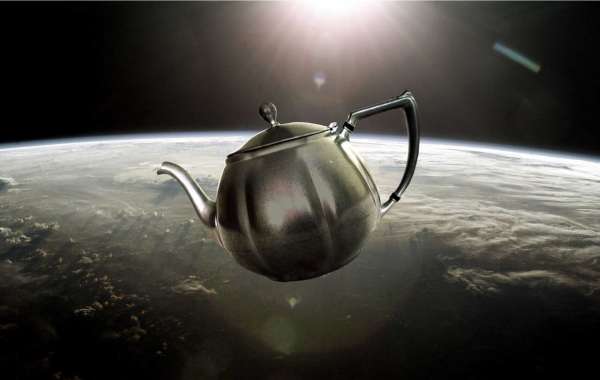The fool says in his heart, "There is no God." (Psa. 14:1; 53:1)
Bertrand Russell was an atheist who in his Is There a God? wrote the following, which has become a popular argument for denying the existence of God:
[N]obody can prove that there is not between the Earth and Mars a china teapot revolving in an elliptical orbit, but nobody thinks this sufficiently likely to be taken into account in practice. I think the Christian God just as unlikely. [1]
Russell's presupposition is that there is no evidence, or at least it is unlikely, that the eternal God existed, thus allowing for his analogy. However, there are some serious problems with Russell's presuppositions:
First, I would ask, "Did Bernard Russell ever exit?" Of course, he did. He lived from May 18, 1872 to February 2, 1970. But did Russell ever exist between the Earth and Mars revolving in an elliptical orbit? No, he didn't. So, the alleged fact that one can't prove that a teapot exists between the Earth and Mars revolving in an elliptical orbit doesn't prove there is no God. Rather, Russell proved that "Someone" could exist, though he wasn't revolving in an elliptical orbit between the Earth and Mars. Thank you Mr. Russell.
Second, in his argument Russell presumes that Earth, Mars, China teapots, space, and orbits exist. He even presumes his own existence to make his own argument. So, he assumes the existence of things to attempt to disprove what he claims does not exist. While he is correct to do so, it also poses a problem regarding his own existence and thought. An illustration may be helpful to reveal the fallacy of such thinking. This is an observation by Cornelius Van Til:
Once while Van Til was a youth traveling on a train in Holland, he noticed a father with his young daughter sitting in his lap. Apparently, the father urged his daughter to do something when she suddenly slapped her father in the face. Van Til's application? The girl's behavior illustrates rebels who live in God's world and who are supported by God's common grace (Psa. 24:1). They sit, as it were, on the lap of God, and it is precisely because they sit on God's lap that they are able to deliver the slap of ingratitude.Thus unbelievers who toot their own independence and autonomy are only able to do so as they are supported by God Himself (John 19:10-11). Their denial of God is His affirmation. Atheism does not invalidate theism, but proves it because atheism is only possible given the premise of theism. As the atheist Nikita Khrushchev once described the Soviet Union, "In Russia, thank God, there is no God" (my emphasis). [2]
Third, when Russell stated that there was no evidence for a teapot floating in outer space (I would also add here the more modern atheist's invisible Flying Spaghetti Monster), he meant that there is no empirical evidence to substantiate this. Empirical evidence refers to what we can see, hear, smell, taste, and touch. It is information received by means of our senses, our observation, and the documentation of patterns and behavior through experimentation. So, what he means is that there is no one who has seen or touched a teapot in outer space. Wow, we don't even have a video!
There are at least two problems here. Russell is comparing two different types of existence and he overlooks the fact that there are numerous evidences that God does exist. As to the first, a teapot is something physical. It can be seen and touched. I can take a picture of it. If it was perking, it could be heard, its tea smelled, and, if given the opportunity, even tasted. However, God the Father is a spirit (John 4:24). Unlike a teapot, he has no form (Deut. 4:12; John 5:37). There isn't a video because you can't see him (1 John 4:20). Therefore, Russell is comparing two different types of existences expecting each to have the same properties. He's attempting to make the Creator have the same properties as what is created. In other words, he is comparing apples to oranges and expecting them to look and taste the same.
As to the second, God did come to earth in the person of Jesus Christ. In John 14:8-9 Philip, a predecessor of Russell, speaking to Jesus said: "Lord, show us the Father, and it is enough for us." Jesus answered: "Anyone who has seen me has seen the Father! So why are you asking me to show him to you?" Therefore, the clear key to Russell's dilemma is to know Jesus. There is plenty of empirical evidence for the existence of Jesus. People saw him, heard him, spoke to him, touched him, and even crucified him. The grave could not hold him and he resurrected from the dead, after which he was seen, heard, and even touched again! (See "Isn't faith blind, irrational and without reason?" below).
There are many other proofs that God exists. Beyond the ontological arguments, cosmological argument, the kalam cosmological argument, teleological arguments, the argument from desire, the argument from miracles and religious experience, there are these:
- There is an innate knowledge of God given to every human being in creation. Why would this be if God didn't exist? Therefore, God exists.
- Mankind has a special intrinsic value that we refer to as dignity. Human dignity exists because God created mankind in his own image. Therefore, God exists.
- The existence of evil demands justice and ultimate justice demands an ultimate righteous Judge. Therefore, God exists.
- The complexity of the universe and its fine tuning points to a Divine Designer who not only created it but sustains it as well. Therefore, God exists.
Though these evidences will continue to be debated, the scales are tipped because the clear and convincing overwhelming evidence is that God exists. Pause here and take a long moment to look at the glory of God's creation and his Christ. Really think about it.
Beyond a reasonable doubt, God exists. The presupposition of Scripture is that God exists ("In the beginning God ..."; Gen. 1:1), and his word is true (Psa. 119:160). He is mentioned 4691 times in the Bible (ESV). Since the Trinity's word is true, God exists! One day every knee will bow to him (cf. Isa. 45:23; Rom. 14:11; Phil.2:10).
Atheism essentially teaches that there was nothing, and nothing happened to nothing, and then nothing magically exploded for no reason into everything. This doesn't sound very rational, but it is a correct summary of atheistic beliefs. And make no mistake here, atheism is a belief; it is a false religion.
Reference
[1 ] Bertrand Russell, "Is There a God?" in The Collected Papers of Bertrand Russell Volume 11, ed. John Slater (New York, NY: Routledge, 1997 ): 547-548.
[2 ] Jim West, "Van Til's Illustrations," (https://chalcedon.edu/magazine/van-tils-illustrations ). Last Accessed 29 November 2017.








